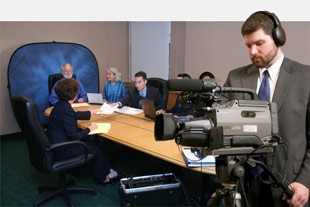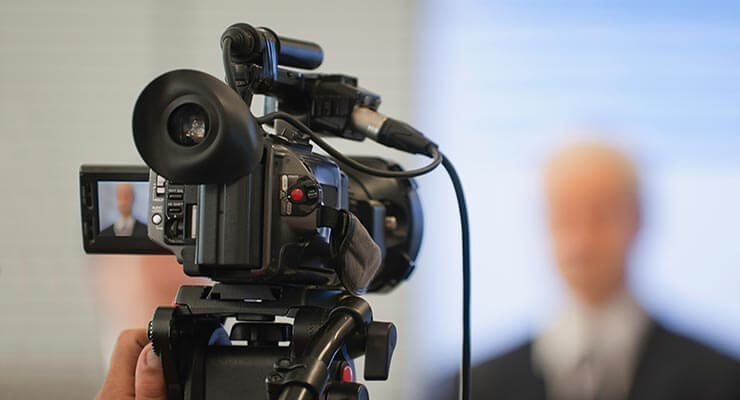Efficient Legal Videography for Lawyers.
Efficient Legal Videography for Lawyers.
Blog Article
The Duty of Lawful Videography in Depositions and Trials
Lawful videography has arised as a vital device in both depositions and trials, giving a diverse approach to documenting witness testimonies. As lawful professionals significantly recognize its worth, it triggers a deeper assessment of how these aesthetic records can influence juror assumptions and test end results.

Significance of Lawful Videography
Legal videography plays a pivotal function in the documents and presentation of depositions and trials. This specific area combines technical skills with legal understanding to develop a reputable document of proceedings that can significantly affect instance end results. The visual aspect of legal videography improves the understanding of witness testament, enabling jurors and courts to observe not just the spoken words but likewise the behavior, feelings, and body movement of the witnesses.
Furthermore, lawful videography gives an unbiased account of occasions, lessening the capacity for false impression that can accompany composed transcripts alone. This visual documentation acts as a vital device during trial presentations, promoting a more clear and more persuasive narrative for both plaintiffs and defendants. The ability to replay video clip sections during court process makes it possible for legal groups to highlight essential factors, strengthening their arguments properly.
The value of legal videography expands beyond the courtroom; it also plays an essential function in preserving proof for future reference, whether for appeals or more legal activity. Because of this, its integration right into the lawful process is essential for guaranteeing a reasonable and precise depiction of the truths, inevitably contributing to the search of justice.

Refine of Legal Videography
While recording the subtleties of depositions and trials, the process of legal videography includes numerous essential steps that guarantee high-grade, accurate recordings. An expert legal videographer prepares by examining the instance materials and comprehending the specific needs of the deposition or test. This prep work consists of acquainting themselves with the individuals and the context, which assists in capturing relevant details.
On the day of the recording, the videographer establishes up the necessary devices, which commonly consists of high-def cameras, microphones, and appropriate illumination. Making sure ideal angles and sound high quality is important, as it directly impacts the effectiveness of the recording. The videographer communicates with attorneys and participants to develop methods, making sure that everybody comprehends the recording process.
Throughout the deposition or test, the videographer carefully tapes the process, paying attention to both verbal and non-verbal signs. This consists of recording the demeanor and responses of witnesses and lawyers. After the session wraps up, the videographer may edit the video for quality and conformity with legal standards, generating an end product that precisely reflects the process for future referral and usage in legal contexts.
Advantages in Depositions
The consolidation of videography in depositions offers numerous benefits that enhance the total process of collecting evidence. One primary advantage is the ability to record witness statements with aesthetic and auditory integrity, supplying a you can try this out more precise representation of the witness's temperament, tone, and body language. This multidimensional strategy enables lawyers and juries to assess reliability better than standard written transcripts alone.
Furthermore, videographed depositions function as a powerful tool for preserving testament. Ought to a witness come to be unavailable for test, their tape-recorded deposition can be played in court, ensuring that their evidence continues to be available and appropriate. This facet considerably lowers the risk of losing vital info that might influence case results.

Finally, videography enhances the overall professionalism and trust of the deposition process, instilling confidence in clients concerning the thoroughness of their legal depiction (legal videography). By leveraging modern technology, lawful experts can considerably enhance the efficiency of depositions
Effect On Trials
In several tests, the combination of videography can considerably influence the discussion of evidence and the court's understanding. Legal videography captures witness testaments and essential proof in i was reading this a dynamic format, permitting jurors to engage with the product on several levels. This aesthetic element enhances the storytelling element of a trial, giving context and emotional resonance that conventional text-based evidence may do not have.
Additionally, video recordings can function as powerful devices for impeachment during interrogation. When disparities develop between a witness's prior declarations and their court room statement, video proof gives an unbiased reference that can guide jurors' opinions. This immediacy and quality can reinforce the trustworthiness of a party's story while at the same time threatening opposing disagreements.

Future Trends in Legal Videography
As we look toward the future of lawful videography, several arising fads assure to improve its duty within the court room. One substantial trend is the integration of expert system (AI) in video evaluation and editing and enhancing. AI can go now simplify the procedure of determining crucial moments in tape-recorded depositions, permitting lawyers to swiftly access appropriate material, thus enhancing efficiency in instance prep work.
Furthermore, the rise of virtual reality (VR) and boosted fact (AR) innovations is expected to change just how jurors experience evidence. legal videography. By submersing jurors in a substitute environment, these technologies can offer a more extensive understanding of complicated scenarios, bring about even more informed considerations
Additionally, the enhancing demand for remote depositions, increased by the COVID-19 pandemic, will likely continue. Lawful videographers will require to adapt to new software program and platforms to ensure high-quality recordings in digital settings.
Last but not least, the growing focus on data security will necessitate more stringent protocols for storing and sharing video clip evidence. As the lawful landscape evolves, lawful videographers must remain abreast of these trends to preserve their importance and efficiency in the judicial procedure.
Conclusion
In recap, legal videography serves an essential feature in the judicial procedure, improving the honesty of depositions and trials. By catching the subtleties of witness testimonies, this tool not only maintains important proof yet likewise help in offering information successfully to jurors. The importance of visual paperwork in examining integrity and facilitating cross-examination can not be overemphasized. As modern technology remains to develop, lawful videography is positioned to more transform its role within the lawful landscape.
Report this page